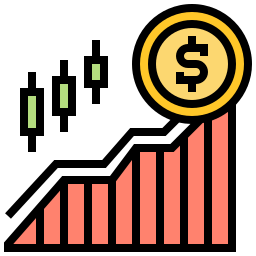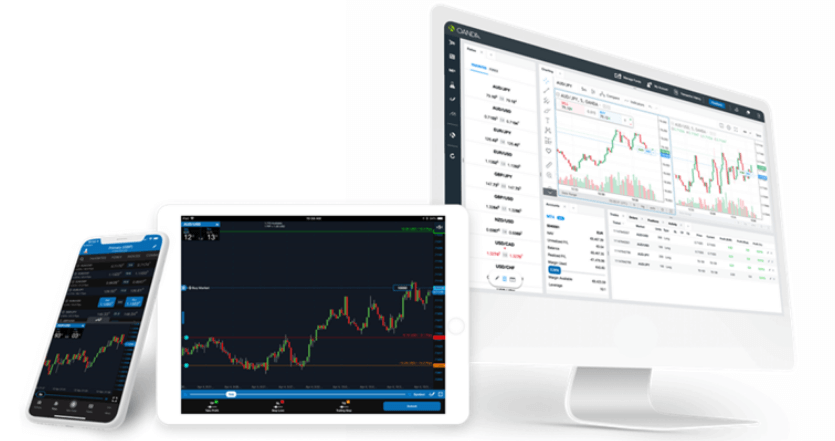 If you watch tons of old movies you would possibly be under the impression that a stockbroker is someone who spends all their life shouting “Sell! Sell! Sell!” into a telephone. There are a couple of these old codgers left on Bay Street, remnants of the old “full service” brokerages which may charge you loads to form one stock trade. But today most stock purchases and sales are executed not by humans, but computers.
If you watch tons of old movies you would possibly be under the impression that a stockbroker is someone who spends all their life shouting “Sell! Sell! Sell!” into a telephone. There are a couple of these old codgers left on Bay Street, remnants of the old “full service” brokerages which may charge you loads to form one stock trade. But today most stock purchases and sales are executed not by humans, but computers.
Best Online trading brokers in Canada
Broker Verified
CySEC, FCA
100% Deposit Bonus
USD 100
1:500
Broker Verified
FCA, ASIC, IIROC
Up to 20% Deposit Bonus
USD 100
1:500
Broker Verified
FCA, ASIC, CySEC
Demo of up to $100, 000
USD 100
1:500
Broker Verified
VFSC, ASIC
Low Spreads from 0.0
USD 10
1:500
Online Trading Platforms
The official legal definition of a broker is “any person engaged within the business of effecting transactions in securities for the account of others in exchange for a fee or commission,” but when it involves trading platforms, computers are “persons” too. There are many online brokers available in Canada which may merit a glance from you if you’re within the market to trade stocks.

Which trading platform is that the best? Probably the one that meets your specific needs and goals. Fees and therefore the interface could be important to some while others might value desktop trading and a good sort of stocks to settle on from. To assist make choosing a brokerage easier, we compare a number of the most online brokerages that operate in Canada. Our comparison includes key features, accounts, and pricing. Your trust is vital to us. That’s why we always do our greatest to be fair and supply complete and accurate information. To finish your homework, we recommend visiting our competitors’ sites to continue your research.
Overview and pricing of Canadian trading platforms
Online stockbrokers were first introduced in Canada in 1996 when TD Bank unveiled WebBroker, Canada’s first online brokerage platform. Since then, there’s been a slow but steady growth of online trading platforms and now, every single one among Canada’s “big six” brick and mortar banks have launched self-directed trading platforms and their accompanying mobile apps. Today, Canadians have quite a dozen online trading platforms to settle on from, an incontrovertible fact that makes this an excellent time for consumers because there’s unprecedented competition bringing trading prices down. But it can bring a troublesome selection process. To assist you to opt, we’ve prepared the subsequent table which outlines a number of the key differences between seven of the foremost popular trading platforms in Canada.
How to choose a web trading platform
When buying online brokers, there are four major considerations you’ll want to weigh. These are values, features, security, and reviews.
Value
Though you’ll buy stocks or ETFs over the phone from humans. This is the easiest, cheapest way to buy stocks. It works through a web discount brokerage. Accounts can probably be opened in ten minutes if you’ve got a social welfare number, a home address, and an employer’s address (freelancers fret not—it’s A-OK if your office happens to be five feet from your bed.) Since stockbrokers by and enormous assess fees or commissions in exchange for creating trades on your behalf, you’ll want to know exactly what proportion you’ll be charged, and the way your account balance and trading frequency will affect those commissions.
Most online trading platforms will assess a flat per-trade commission fee for any security purchase, big or small, that generally ranges from $5-$10 per online trade. These fees could also be higher or lower counting on your account balance and trading habits. Since you’ll get to open an account to trade, you’ll want to read the fine print and choose which suits you best, though below you’ll see that we’ve taken the freedom of going deep into the banks’ account agreements and disclosures and summarized our findings. Pro-tips: If you’ve got a little amount of cash to take a position, look out for a provider that gives a coffee minimum investment to open an account. Also, does the brokerage assess any fees beyond trading fees?
Features
Another important question you’ll want to ask yourself is beyond actually executing the trade, what other investment-related services are important to you? Are you reasonably technologically savvy or think you’ll need some human handholding to assist you to execute trades? does one imagine you’ll want to pursue a set-it-and-forget-it strategy of investing—buying a couple of stocks, mutual funds and/or ETFs or other securities and leaving them alone to grow? Or does one imagine you’ll be trading tons, even daily, and in need of the type of research that sophisticated “pro tools” that active traders require?
Here’s a litmus test: does one know what “simple moving averages,” “Bollinger bands,” and “stochastics” are? These are a couple of fairly basic terms for active investors, so if they sound like stuff Dr. Seuss made up, you almost certainly won’t need very advanced research tools (and probably shouldn’t hand over your day job yet to become each day trader.)
Security
The most basic thing any stockbroker should offer is peace of mind to understand that no matter your investing acumen, your broker’s not getting to disappear together with your money. So don’t fall for any online phishing scams or too-good-to-to be true stock offers from random callers. You ought to hunt down a brokerage, not the opposite way around. (Every broker we compare here is 100% legit, so no got to fret about any of those particular players blowing your investment on bottle service vodka and poker debts).
If your broker is legit, it’ll almost certainly be a member of the Investment Industry Regulatory Organization of Canada (IIROC) and you’ll be ready to find it on IIROC’s website, though don’t call the police if you don’t see your broker immediately since some brokers do business under separate business names. Contact your broker if you can’t immediately find them. Being an IIROC member should put your mind comfortable a touch since all IIROC members are insured under the Canadian Investor Protection Fund (CIPF) so if anybody of them becomes insolvent, all their clients are going to be reimbursed up to $1,000,000 of their investment. Of course, the CIPF is going to be no help if you invest poorly and lose most or maybe all of your money.
How to verify IIROC verification
 You should not just take the words of the Forex broker for it. Rather, you should check if the broker is truly regulated. You can do this by verifying the verification by yourself. This is not an entirely difficult thing to do. Even a beginner in forex trading can easily verify if the broker is regulated or not. What you need to do is to scroll down to the bottom of the website of the broker. You will find the regulation information of the broker there.
You should not just take the words of the Forex broker for it. Rather, you should check if the broker is truly regulated. You can do this by verifying the verification by yourself. This is not an entirely difficult thing to do. Even a beginner in forex trading can easily verify if the broker is regulated or not. What you need to do is to scroll down to the bottom of the website of the broker. You will find the regulation information of the broker there.
You can also check the “About Us’ page of the broker. This can equally show you if the broker is under the coverage of IIROC or not. One other way to do this is to visit the website of IIROC. The regulatory body lists out the Forex brokers it covers on its website. All you need to do is to check the list to see if your preferred broker is among them or not. The last tip is the best way to do things. This way, you will not fall for the deceit of deceptive brokers.
Online trading rules in Canada vs. the United States
In case you do not know, online trading rules differ in the United States and Canada, for one, the bodies regulation online trading in Canada differs from that of the united states. In Canada, it is the responsibility of the IIROC to regulate Forex trading. In the United States, there are two bodies responsible for online trading regulations. These two bodies are:
- National Futures Association (NFA)
- Commodity Futures Trading Commission

All brokers for online trading should register with the NFA. The rules that govern the online trading industry in the United States were signed into law in 2010. Its name is the Dodd-Frank Act. It constitutes the rules that govern online trading. All brokers of US origin must register with the NFA and brokers operating in the United States must register with the CFTC. This means that the CFTC has a broader responsibility than the NFA. The function of the two bodies is similar. They are to promote the following in online trading in the United States:
- Ensure transparency
- Promote integrity
- Carry out regulatory responsibilities on the brokers.
- Protect the interest of online traders.
The NFA provides Background Affiliation Status Information Centre (BASIC). It is an online verification system. It is open to online traders to verify the authenticity of brokers. So, the trader can use BASIC to check if the broker is truly regulated by the NFA. The Securities Exchange Commission (SEC) plays no role in regulating the online trading industry in the United States.
Account cross-registration
Aside from differences in regulatory bodies, brokers in the United States will not allow someone from Canada to register with them. This means that you can only register with a broker for Canadian traders. It goes a long way to show the difference between the two counties in terms of online trading regulations. Additionally, the margin rules and leverages also differ between the two countries.
Different types of online trading in Canada
Online trading is a broad term that refers to so many assets and instruments. You will need to pick particular ones among them when you want to venture into online trading in Canada. Check below for some of the various types available.
Major categories of online trading
The major categories of online trading are:
- Long-term trading: As its name implies, the trader leaves his trading position open for a very long time. The time can be as short as several months and as long as several years. Traders in this category are risk-takers. They focus on the bigger picture and do not worry about the periodic fluctuation in price. Only experienced online traders use this method of trading.
- Medium-term trading: The trader can leave his position open for several weeks or months. The risk level in this category is moderate.
- Short-term trading: Traders in this category can leave their trades open for hours or days. Some can leave their trading position open for weeks. This category involves minimal risk. It is the method of choice for many beginners in online trading.
Examples of online trading
Some of the examples of online trading are highlighted below:
- Stock trading
- Forex trading
- Index trading
- Cryptocurrency trading
- Futures trading
- Commodity trading
Online trading permits what is called CFD trading. CFD stands for Contract for Difference. In CFD trading, you do not need to own the asset. You only speculate on the change in prices of the asset. You can also make a profit both when the value of the asset rises and falls. CFD trading is risky, but it generates more profit than traditional trading. Online traders can use leverage to further boost their trading capability.


